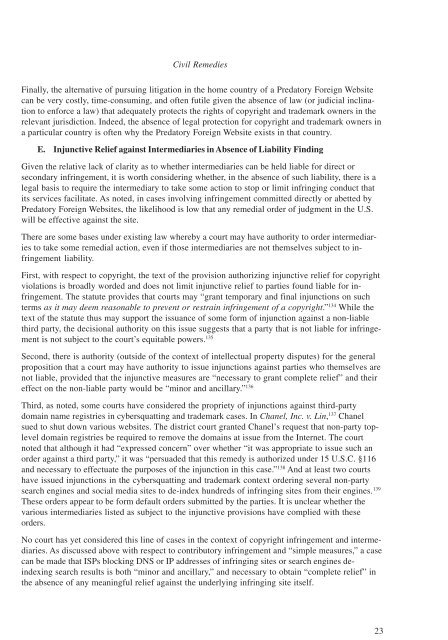1oz61wa
1oz61wa
1oz61wa
You also want an ePaper? Increase the reach of your titles
YUMPU automatically turns print PDFs into web optimized ePapers that Google loves.
Civil Remedies<br />
Finally, the alternative of pursuing litigation in the home country of a Predatory Foreign Website<br />
can be very costly, time-consuming, and often futile given the absence of law (or judicial inclination<br />
to enforce a law) that adequately protects the rights of copyright and trademark owners in the<br />
relevant jurisdiction. Indeed, the absence of legal protection for copyright and trademark owners in<br />
a particular country is often why the Predatory Foreign Website exists in that country.<br />
E. Injunctive Relief against Intermediaries in Absence of Liability Finding<br />
Given the relative lack of clarity as to whether intermediaries can be held liable for direct or<br />
secondary infringement, it is worth considering whether, in the absence of such liability, there is a<br />
legal basis to require the intermediary to take some action to stop or limit infringing conduct that<br />
its services facilitate. As noted, in cases involving infringement committed directly or abetted by<br />
Predatory Foreign Websites, the likelihood is low that any remedial order of judgment in the U.S.<br />
will be effective against the site.<br />
There are some bases under existing law whereby a court may have authority to order intermediaries<br />
to take some remedial action, even if those intermediaries are not themselves subject to infringement<br />
liability.<br />
First, with respect to copyright, the text of the provision authorizing injunctive relief for copyright<br />
violations is broadly worded and does not limit injunctive relief to parties found liable for infringement.<br />
The statute provides that courts may “grant temporary and final injunctions on such<br />
terms as it may deem reasonable to prevent or restrain infringement of a copyright.” 134 While the<br />
text of the statute thus may support the issuance of some form of injunction against a non-liable<br />
third party, the decisional authority on this issue suggests that a party that is not liable for infringement<br />
is not subject to the court’s equitable powers. 135<br />
Second, there is authority (outside of the context of intellectual property disputes) for the general<br />
proposition that a court may have authority to issue injunctions against parties who themselves are<br />
not liable, provided that the injunctive measures are “necessary to grant complete relief” and their<br />
effect on the non-liable party would be “minor and ancillary.” 136<br />
Third, as noted, some courts have considered the propriety of injunctions against third-party<br />
domain name registries in cybersquatting and trademark cases. In Chanel, Inc. v. Lin, 137 Chanel<br />
sued to shut down various websites. The district court granted Chanel’s request that non-party toplevel<br />
domain registries be required to remove the domains at issue from the Internet. The court<br />
noted that although it had “expressed concern” over whether “it was appropriate to issue such an<br />
order against a third party,” it was “persuaded that this remedy is authorized under 15 U.S.C. §116<br />
and necessary to effectuate the purposes of the injunction in this case.” 138 And at least two courts<br />
have issued injunctions in the cybersquatting and trademark context ordering several non-party<br />
search engines and social media sites to de-index hundreds of infringing sites from their engines. 139<br />
These orders appear to be form default orders submitted by the parties. It is unclear whether the<br />
various intermediaries listed as subject to the injunctive provisions have complied with these<br />
orders.<br />
No court has yet considered this line of cases in the context of copyright infringement and intermediaries.<br />
As discussed above with respect to contributory infringement and “simple measures,” a case<br />
can be made that ISPs blocking DNS or IP addresses of infringing sites or search engines deindexing<br />
search results is both “minor and ancillary,” and necessary to obtain “complete relief” in<br />
the absence of any meaningful relief against the underlying infringing site itself.<br />
23


